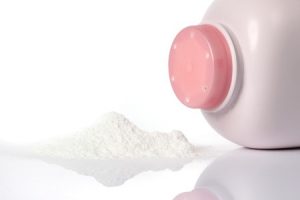Report: J&J Knew for Decades About Asbestos in Baby Powder
Report: J&J knew about asbestos in their products and issued no warning
In a new report that drove the company’s shares down more than 9%, Reuters stated that Johnson & Johnson has known since the 1970s that its talc baby powder sometimes contained carcinogenic asbestos.
Reuters based its report on a review of documents and deposition and trial testimony that showed that from at least 1971 to the early 2000s, the company’s raw talc and finished powders sometimes tested positive for small amounts of asbestos. Company executives, managers, doctors and lawyers discussed the problem amongst themselves but didn’t inform regulators or the public. The documents examined by Reuters also describe successful efforts to influence U.S. regulators’ plans to limit asbestos in cosmetic talc products and scientific research on the health effects of talc.

J&J has said it will appeal the recent verdicts against it. The company has maintained in public statements that its talc is safe, as shown for years by the best tests available. “Plaintiffs’ attorneys out for personal financial gain are distorting historical documents and intentionally creating confusion in the courtroom and in the media,” Ernie Knewitz, J&J’s vice president of global media relations, wrote in an emailed response to Reuters’ findings. “This is all a calculated attempt to distract from the fact that thousands of independent tests prove our talc does not contain asbestos or cause cancer. Any suggestion that Johnson & Johnson knew or hid information about the safety of talc is false.”
Johnson & Johnson released a statement calling the Reuters article “one-sided, false and inflammatory.” “Simply put, the Reuters story is an absurd conspiracy theory, in that it apparently has spanned over 40 years, orchestrated among generations of global regulators, the world’s foremost scientists and universities, leading independent labs, and J&J employees themselves,” the company said in a statement.
In the wake of the Reuters report, J&J stock dropped 9.3%, on pace for its worst day in more than a decade, when its shares fell 15.85% on July 19, 2002 as federal regulators investigated a former employee’s allegations of false record-keeping at a plant that made an anemia drug linked to serious side effects.

Marion Munley
Marion Munley has been practicing personal injury law for nearly 40 years. She is triple board-certified by the National Board of Trial Advocacy for Truck Accident Law, Civil Trial Law, and Civil Practice Advocacy. She currently serves as Vice President of the American Association for Justice, an organization dedicated to safeguarding victims’ rights. Marion has won many multimillion-dollar recoveries for her clients, including one of the largest trucking accident settlements in history. She has been named a Top 10 Super Lawyer in Pennsylvania since 2023, a Best Lawyer in America, and was recently inducted to the Lawdragon Hall of Fame.
Posted in Personal Injury, Product Liability & Recalls.
Tagged Appeal









